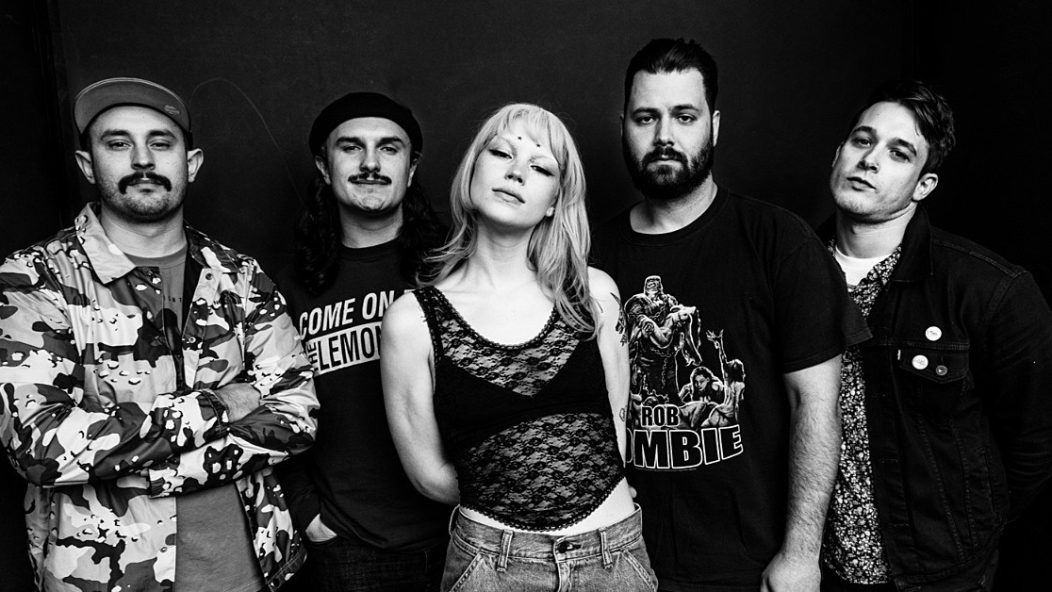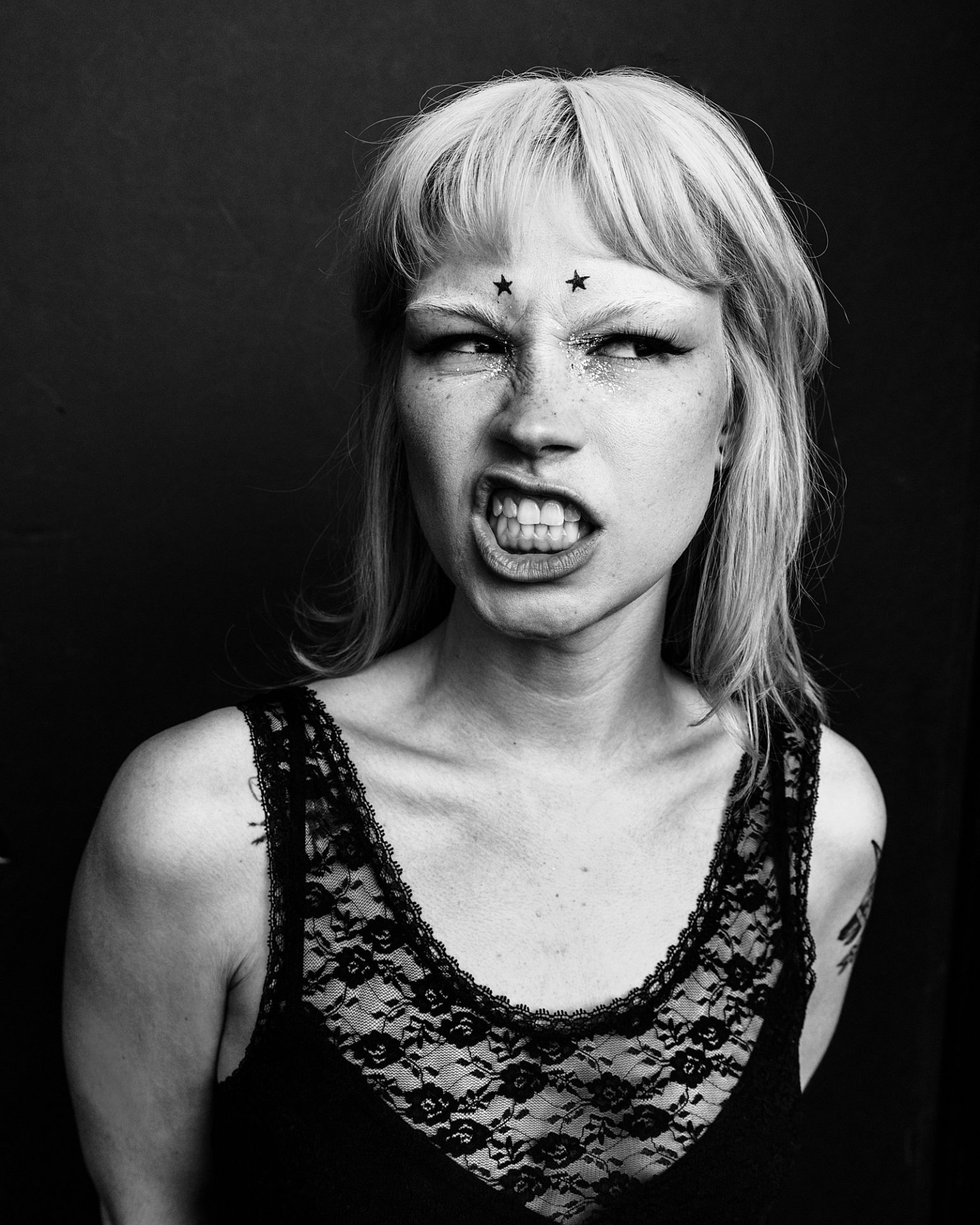
Welcome to Scowl season
Scowl appear in our 2023 summer issue, which you can buy here. Head to the AP Shop to grab exclusive vinyl of their Psychic Dance Routine EP, limited to 600 copies.
Less than 72 hours ago, Travis Barker and “his wife,” as Scowl principal songwriter and guitarist Malachi Greene refers to Kourtney Kardashian, stood side stage at Coachella as his band ripped through a frantic hardcore set with some hooks indebted to late ’70s English post-punk. It’s a feat that was once completely out of the realm of possibility for a young hardcore band with deep DIY roots, far removed from the corporate ethos of the festival, but it happened. It’s one of the many impossible moments the band have been racking up: Post Malone wore their shirt at the 2022 inaugural Formula 1 Grand Prix in Miami, an event attended by more than 243,000 people. Paramore’s Hayley Williams has shouted them out on her BBC radio show.
“It’s fucked up and crazy!” singer Kat Moss cheers. “I was born in 1997, so blink-182 was my first example of punk. Now I exist in a world where people like that might find out about my band. It’s totally trippy.”
Read more: 15 best modern hardcore bands for day one fans
Coachella is a far cry from playing an explosive set at a New Jersey Sonic Drive-In, but maybe not so much opening for Limp Bizkit at Madison Square Garden, and Scowl have done both in the last year. (Greene joined LB for a cover of Rage Against the Machine’s “Killing In The Name”; Fred Durst first found out about them, slid into their DMs, and the rest is history.) For the kind of punk bands that play fast food parking lots and warehouse spaces, the world’s most famous arena with the nü-metal band that somehow made Woodstock ’99 look worse than it already was might not seem that appealing — it’s certainly not a capital-p purist punk take.
But Scowl had no reservations. “We’re so not hesitant when it comes to things like that. We’re like, ‘This is a cool opportunity, like, once in a lifetime.’ What fucking DIY punk band plays MSG? That’s so ridiculous and stupid,” Moss explains. It helps that this band don’t take themselves seriously at all, despite what some stuck-up spiky jacket might say. “I feel like my life is a fucking troll. It does not make sense. I never imagined I’d even play music, let alone, do that.” Once the offer was in, she quit her day job on the spot. It was the right move.
Scowl, for the unfamiliar, formed in 2019 in the thriving Santa Cruz/Bay Area California hardcore scene — the same that birthed the powerviolence days of Ceremony, now home to Drain, Gulch and Sunami — frequently cited as one of the most exciting punk communities in the country. Their story goes a little something like this: Moss and Greene are partners; Moss expressed interest in being in her first-ever band, Greene got drummer Cole Gilbert involved and they started writing what would become Scowl’s debut self-titled EP in May 2019. They finished it in a month, with lyrics written in a day. Guitarist Mikey Bifolco and bassist Bailey Lupo rounded them out, and they released another EP, November 2019’s Reality After Reality… — both straightforward collections of explosive hardcore — leading to their 2021 debut LP, How Flowers Grow, through Flatspot Records. It became the release responsible for the band’s newfound success, a ripping 15-minute debut full-length with a few unexpected sonic detours.
Like on “Seeds to Sow,” with its cheeky saxophone and Moss slowing her guttural roar to sing. It hits like an aesthetic concept record on evolution, flowers and growth, and that’s because it’s meant to: Moss’ influences include surrealist painter Salvador Dali, Billie Eilish, Sonic Youth and Pavement. “I don’t want to give myself a pat on the back, but I like tying things up in a bow, making it somewhat conceptual. There’s a little bit of a world,” she says. “I don’t know. My favorite band is My Chemical Romance, and when I listened to The Black Parade, it was a whole world I felt so seen in. I want to make something that feels whole.” (Unfortunately, Scowl have yet to open for MCR, but it only feels like a matter of time. However, Frank Iero invited them to attend his band’s 20-year anniversary show on 9/11 in Brooklyn, so they’re getting closer.)
The band’s most recent release is another EP: Released in April on Flatspot, Psychic Dance Routine — produced by Philly legend Will Yip — is their most melodic effort to date. On it, their unique brand of hardcore endures, but so too do pop-oriented hooks. There’s much more singing than screaming (not unusual when a new punk band frontperson gets better acquainted with her voice; look at Mannequin Pussy or even 100 gecs), but it certainly challenges a pedant perception of hardcore. “We’re all just exploring our musical abilities. I’ve never sung in a band or played in a band. Malachi is trying new things constantly,” Moss says. “Now I know how scary it is to color outside of the lines, but I wasn’t thinking, ‘Is this hardcore enough?’”
“To be honest, I don’t give a shit if people think our songs sound hardcore because we came from hardcore. We’re true to our scene,” Greene jumps in. He should know — he’s booking shows on the road. “More than the music itself, hardcore is a community. There’s a mindset and an ethos. If we make a song that doesn’t sound like a hardcore song, that influence is still there — in the drums, the riffs, the song structure.”

[Photo by James Hartley]
Take the following words with a generous grain of salt: Music is in a hardcore-curious moment. Turnstile are evidence enough, a band embraced by both the mainstream and the hardcore DIY network they came up in. But at a time when indie-rock bands of any popularity zoom through to mainstream consciousness, guitar-drums-bass lovers are looking into the underground network for exciting sounds and lively crowds. It should come as no surprise that Scowl have bubbled up from the DIY world, but that doesn’t make it any less exciting or important.
In advance of Psychic Dance Routine, Moss wrote that the EP centered around “being consumed as the version of myself that is ‘performing’ has shifted dramatically, while simultaneously grappling with the experience of being a feminine artist in a world that doesn’t always take you seriously.” In far less romantic prose: In every great new room this band get to occupy, she’s acutely aware of how she is being perceived: as a frontperson, as a woman, as a woman frontperson who prefers to dress in an outwardly feminine fashion and as public person instead of a private one. (In hardcore, it may feel obvious to spell out, bands are your friends — there are no stages, no quality PAs, no hierarchies. At Coachella, there are VIPs.)
“I have a spiteful part of me, and I like being this hyper-feminine person, and people are really offended by that sometimes,” she says, wondering why those same people feel threatened by her femininity. “The way I hear certain people talk in certain spaces about women and art — it doesn’t matter how artistic they are; they will constantly be objectified, and I’m sick of it. I can’t change the world, but I am going to talk my shit about it. It goes back to what punk and hardcore are about: If you have something to say, say it, screaming, into a microphone.”
“There are no rules,” Moss pauses, and Greene picks it up, “And it’s funny — it’s funny to break the rules.” It is also, objectively, punk.










